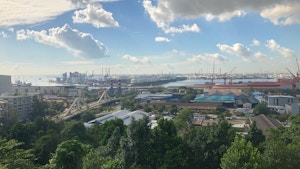Directors on energy boards today face a litany of pressures, from smoke bomb threats to intimidation tactics, as the complex energy transition has polarised people on both ends of the debate.
This is why board directors of energy companies “need to have courageous hearts”, says energy industry veteran Goh Swee Chen, who used to lead Royal Dutch Shell’s operations in the city-state as its first female chairperson. Goh now sits on the board of Woodside Energy, Australia’s biggest oil and gas producer.
Referring to how directors normally already are covered by D&O insurance, an abbreviation for “directors and officers insurance” which reimburses for fees, settlements and financial losses when legal claims are made, Goh joked that such an insurance is no longer enough.
To continue reading, just sign up – it’s free!
- Get the latest news, jobs, events and more with our Weekly Newsletter delivered to you free.
- Access the largest repository of news and views on sustainability topics.
- You can publish your jobs, events, press releases and research reports here too!
Newsletter subscribers do not necessarily have a website account. Please sign up for free to continue reading!
“Being directors on an energy board, we almost need life insurance,” she said at the Unlocking capital for sustainability event held in Singapore last month.
Speaking at a fireside chat on the role that boards play in an equitable transition, Goh, who is also the chairman of Singapore’s National Arts Council, said that she chose to be on an energy board despite the pressures as she believes that energy is one of the most important inputs for economic and human development, and that it is the responsibility of energy companies to “deliver a strategy that will allow a smooth and orderly transition as much as possible.”
“The landscape is very disorientating right now, but boards need to guide the management team, get them to be honest about the company’s ability to deliver against its net-zero plans, and do that in a way that serves multiple stakeholders,” she said.
ESG politicised?
For global energy giants, raucous meetings with a strong presence of environmental protesters and climate-focused shareholders have become the norm in recent years. Even though shareholder activists – that is, individuals who attempt to use their rights as a stakeholder of a publicly-traded corporation to bring about change from within – have reportedly failed to win more than 50 per cent in many key proxy votes, the trend persists.
Goh, who is also a director of Australian energy firm Woodside and other Singapore-listed companies, described how a smoke bomb by climate activists had been detected before the AGM started. “The directors now have to travel in protected cars with tinted glass,” she said.
According to media reports, before the April AGM, activist investor groups had threatened to vote against the re-election of three board directors, over Woodside’s climate strategy. The three directors withstood the push and were re-elected.
“
I worry that sustainability has now become an idelogy. It used to be a business strategy and we wanted to use business as a force for good. Now it is starting to get unwieldy and it is de-stabilising as we could have a very disorderly energy transition.
Goh Swee Chen, director, Woodside Energy and former chairperson, Shell Singapore
Goh also shared about her conversations with a former CEO of a major energy company who would often travel to Singapore. She said: “Last year, when he was in Singapore for his farewell, I asked if he felt there was any unfinished business. He said ‘yes’ – it was not being able to get ahead of the energy transition narrative – an exceedingly difficult task.”
Goh said she was in agreement, as companies ultimately need to deliver profits and investment returns for all stakeholders, yet there now is “a lot of pressure…to be greener than green” which she said is concerning. “I worry that sustainability has now become an ideology. It used to be a business strategy and we wanted to use business as a force for good… Now it is starting to get unwieldy and it is dangerous as we could have a very disorderly energy transition,” she said.
Jessica Cheam, founder and managing director of Eco-Business, who moderated the session, highlighted that it is hard to find a consensus among different stakeholders on how fast or slow the energy transition needs to be, and whether some disorder is necessary to expedite the shift to meet key climate goals.
Shai Ganu, chair of the environment, social and governance (ESG) committee at Singapore Institute of Directors who sits on multiple boards, said that the politicisation of and “slightly negative” connotations to the ESG term can be distracting for board members. “Don’t let that deter you from the course you are on,” he suggested.
Ganu, who is also managing director and global practice leader at multinational advisory firm Willis Towers Watson, suggests that frameworks can help structure a board’s agenda. Beyond the board’s mandate, capacity and structure, the need for directors to understand complex risks and liabilities is becoming more crucial, he said.
“The non-linearity of today’s world and its incomprehensible nature is also something that directors have to grapple with before they make any decisions,” he said. “Directors are trained to recognise patterns and we use prior experiences to apply our best judgment for the future, but now that patterned mechanism is almost gone.”
“We can no longer say: When I was an executive, this problem came up and this was how I solved it. That is no longer going to be the case,” he said, adding that board directors will increasingly need to be able to deal with “black swan” events that happen once in a lifetime.
Covid-19 and climate
Goh added that board directors are essentially stewards who need to help make sure that the company can have long-term sustainability and endure over time. A simple mantra that she keeps to when making decisions: “Do well, do right, do good”.
She said this applied when the Covid-19 pandemic struck, while serving as a board member of national carrier Singapore Airlines. “Never in our wildest dreams did we dream up a scenario where the skies would close and when airplanes cannot fly. The airline company faced numerous challenges – one being that it had literally no revenue. But we still came to a consensus that we would go ahead and commit to achieve net-zero carbon emissions by 2050 amid the crisis,” she said.
Goh said when the decision was discussed, the pathways to meet such a target weren’t clear though the company knew what short-term actions it could take. It would renew its plane fleet as newer planes had better fuel efficiency; it also piloted new meal concepts which saw a reduction of single-use plastics – and which unfortunately received some flak from consumers who felt that the use of paper boxes affected the overall in-flight dining experience, as the served food appeared “cheap” and looked like a cost-cutting measure.
“We looked at the feedback and knew we needed to just do a better job of communicating and try to make the design of these meal boxes more presentable,” she said. Singapore Airlines later decided not to proceed with using paper boxes for food on medium- and long-haul flights for the time being.
Cheam, who sits on the board of Singapore’s largest taxi operator ComfortDelGro, acknowledged that the Covid-19 crisis brought about difficult conversations for directors. Despite facing financial challenges, the company made a conscious decision to roll out aid packages and generous rental subsidies for cab drivers who saw their incomes dry up overnight.
The transport operator was also one of many companies which announced that it would cut the fees and salaries of its board of directors and senior management due to the pandemic.
Cheam said: “At the height of the pandemic, there was talk of cutting staff but the board said ‘no’. If we had done that, what does it say about us as a company?”
Correction note (26 Oct): The original article stated that thousands were evacuated from the convention building during Woodside’s April AGM after protesters allegedly released a stench bomb. This is inaccurate and has been amended. We apologise for the error. The article has been edited for clarity.





















